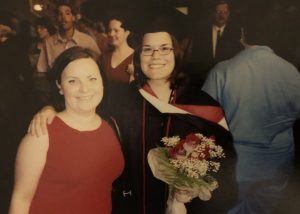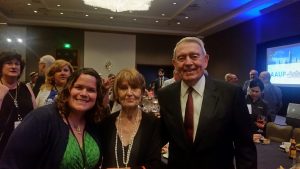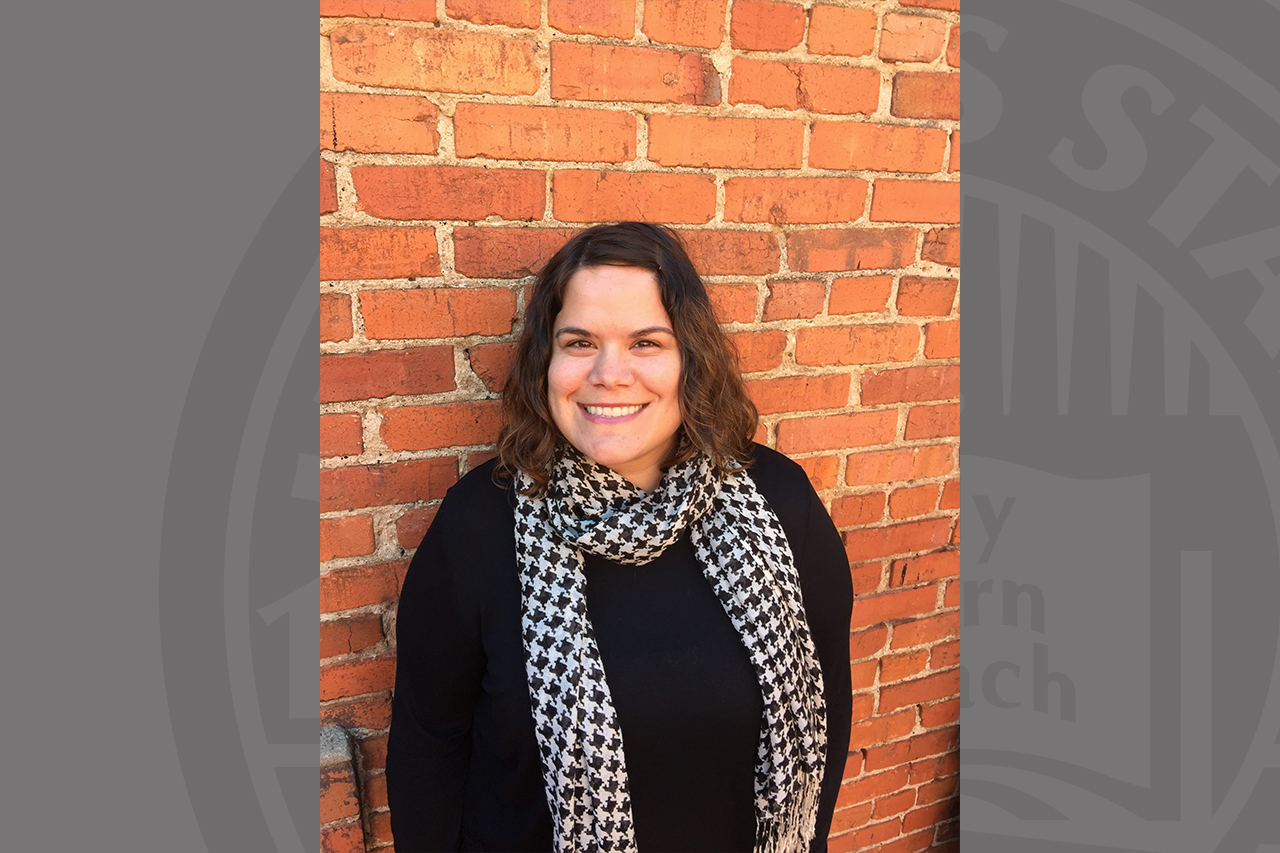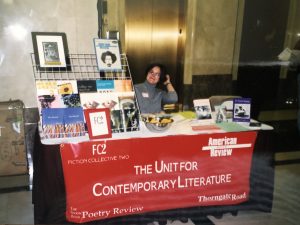Lisa Savage ’01, M.S. ’03, is an Illinois State University alumna from the former publishing and the nonprofit literary arts program (currently publishing studies) in the Department of English. She spent her time at Illinois State as a production intern at the Publications Unit and a member of Sigma Tau Delta, the national English honor society.
Currently serving as the pre-production manager in books editorial at Duke University Press, Savage oversees the workflow of book projects between books editorial and different groups at the press, guides the preparation of manuscripts and artwork, and assists with the student worker program for books editorial. This is Savage’s second position at Duke University Press. Before starting her current position in February of 2020, she was the journals production coordinator for almost four years. In that position, she worked on journals like the Journal of Chinese Literature and Culture, Small Axe, and Genre.
Using skills from the publishing program and work at the Publications Unit, Savage was able to secure jobs that launched her career in book and journal publishing and production.
At the Illinois State University Publication’s Unit, Savage was able to develop valuable publishing-related skills including completing book design and layout on two Fiction Collective Two (FC2) books, Reel to Real by Lidia Yuknavitch and Gone by Elisabeth Sheffield. After graduating from Illinois State, Savage came back to spend a semester as the instructor for English 254: Introduction to Professional Publishing. Using skills from the publishing program and work at the Publications Unit, she was able to secure jobs that launched her career in book and journal publishing and production. She created publicity materials for Fault Lines by Meena Alexander for The Feminist Press, managed permissions for The Story of Science by Joy Hakim for American Historical Publications, and produced many journal issues for the University of Illinois Press.

Lisa Savage (right) celebrates participation in the 2011 Illinois Marathon with other University of Illinois Press staff Lisa Bayer (left, now director of University of Georgia Press), Louis Mesker (center left, now retired), and Cheryl Jestis (center right).
To find out more about her experiences in the field of publishing and how her work at the ISU Publications Unit prepared her for her career, we had the opportunity to interview Lisa Savage.
How did you develop an interest in publishing?
As an undergraduate English major, I initially wasn’t sure what my career path would be. I didn’t want to teach, and I wasn’t a writer, so my academic adviser encouraged me to connect with Tara Reeser, who was then the director of the Publications Unit. Like all English majors, I loved to read, and interning at the Publications Unit sounded like a great way to be closer to books and literary publications and explore all of the possibilities that the publishing industry might bring to someone unsure about the next steps in her career.
How did your time at ISU and the Publications Unit prepare you for work in the publishing industry?
My time at the Publications Unit as an undergraduate intern and graduate assistant was incredibly formative. I was trained on every aspect of publishing, from beginning to end, including mailings, database entry, proofreading, typesetting, customer service, etc. The comprehensive training at the Publications Unit really gave me an advantage once I began applying for jobs in publishing because I could list actual publishing experience on my resume. I also felt very supported by Tara, who was great at mentoring all of the students at the Publications Unit. She encouraged me to take on tasks that seemed scary, such as typesetting American Book Review (ABR), because she knew that the students at the Publications Unit were capable of much more than even they knew. I know that this spirit of collaboration and mentorship has continued and blossomed at the Publications Unit over the years.
I also had the honor of working with ISU professors at the Publications Unit, in addition to taking their classes in the English department, such as with Charles Harris on ABR and with Lucia Getsi on Spoon River Poetry Review (SRPR). I was able to foster professional working relationships and friendships with these professors, even as I worked on assignments for their classes, which gave me more confidence in my abilities as a student and in my burgeoning publishing career.
What skills and experiences were the most valuable when you were entering the job market, and have you witnessed a change in expected entry-level skills as you’ve traversed the field of publishing?
“Having such a wide range of training at the Publications Unit in books, journals, and literary publications was the most valuable asset when I first began looking for publishing jobs.”
I can definitely say that having such a wide range of training at the Publications Unit in books, journals, and literary publications was the most valuable asset when I first began looking for publishing jobs. This meant that I could potentially apply for entry-level positions in several different departments at publishing companies and have the experience to back it up. I think that competency in project management and communication skills will always be seen as important to employers.
Regarding entry-level skills, experience in the realm of publishing is still notable, but there’s been a big push in scholarly publishing to make publishing more equitable and inclusive, and this involves widening the net of applicants to include candidates who may not have gotten an interview in the past. I think that the industry and the resulting scholarship will be much richer for it.
What does your typical workday at Duke University Press look like, and what skills do you draw on most?
“I make good use of the Adobe Creative Suite, having learned Photoshop and a version of InDesign when I was at the Publications Unit.”
I recently started a new position in books editorial, which has been a bit of a culture shock since I spent so many years working in journals. My past experience working on the books side at other presses has certainly helped me to acclimate to the different pacing that exists in the books workflow versus journals, but my new position encompasses new responsibilities and challenges that are exciting and allow me to use all of the skills I’ve learned throughout my career.
A big portion of my job as pre-production manager is to oversee and guide the preparation of manuscripts, artwork, and permissions documentation for all books published by the press. One aspect of that part of my job is to evaluate all the art programs for our books before they are transmitted to the editorial, design, and production (EDP) department. I work with an art assistant to vet the art and prep the images so they are print quality. The art goes through formal art prep once a book is transmitted; however, I am the first line of defense to ensure that EDP can work with art programs that are pretty much ready to go. I make good use of the Adobe Creative Suite, having learned Photoshop and a version of InDesign when I was at the Publications Unit. This is a pretty creative part of my job, and I get to have a stake in forming an art program for each book published by the press. This work often involves collaboration with the editorial associates, who communicate with authors regarding any questions we may have about the art, and also the design department, with whom we may consult regarding particularly tricky art.

Lisa Savage (right) with fellow Publications Unit Graduate Assistant Sarah Roeder at Illinois State University graduation, 2003.
I’m also responsible for coordinating with other groups at the press to establish workflows that are timely and efficient, benefiting books editorial, EDP, and the intellectual property department. Effective and diplomatic communication skills are key in this role, and working with many authors, editors, and vendors over the years has prepared me well for the new position. I view this position as a culmination of almost 20 years in the publishing industry.
What has been your favorite project while working for Duke University Press, either in your current position or in your previous role as journals production coordinator?
My favorite project thus far was participating in the Society for Scholarly Publishing (SSP) Mentorship Program in 2019. I became a member of SSP and filled out an application to be matched with a mentor who would have a range of experience across the entire spectrum of the publishing world. Even though I’ve been in the publishing industry for a long time, I found myself at a crossroads where I was not finding many opportunities to grow or move up in my position as production coordinator. I was matched with another member of SSP who had worked in publishing but also had a tremendous amount of experience in technology—he founded his own technology company, which provides access management software to libraries, publishers, etc.
“I credit my mentorship with giving me the confidence to apply for a position that I may not have felt I was experienced enough for.”
Initially, I was a little uncertain about the match, since it didn’t seem like our experience lined up. However, I quickly learned that the match was pretty perfect. With my mentor, I was able to dig deep into my publishing experience and unearth skills that were applicable to a wide variety of publishing jobs (and beyond), and he really boosted my confidence in my abilities as a publishing professional. His experience in publishing and as an entrepreneur helped me to see that my publishing experience wasn’t just a narrow set of skills, and he saw in me that I was ready to step into a new role at Duke University Press. I credit my mentorship with giving me the confidence to apply for a position that I may not have felt I was experienced enough for.
Do you have any advice for current ISU students looking to pursue a career in the publishing industry?

Lisa Savage (left) with keynote speaker Dan Rather and his wife, Jean Goebel, at the 2017 Association of University Presses annual meeting in Austin, TX.
I encourage students to learn as much as possible about every step in the publishing process through internships, assistantships, fellowships (in 2016, for example, Mellon began funding a University Press Diversity Fellowship program), publishing webinars, attending publishing conferences, etc. I would also say that networking is very important, and there are many publishing organizations such as AUP (Association of University Presses) and SSP (Society for Scholarly Publishing) that offer networking opportunities for people just starting their publishing careers.
“I would encourage students to find mentors, whether it be a professor, internship or assistantship coordinator, publishing professional, etc.”
I also think it’s important to consider all of the skills or interests you may have, even if you think they do not apply to publishing. For instance, I enjoy creating Photoshopped holiday cards, and this experience was actually viewed as an asset to the hiring manager for my current position as pre-production manager. Project management skills are also very important, so consider any project management skills you have acquired through school projects or other jobs, which will be valuable to prospective employers. In addition, I would encourage students to find mentors, whether it be a professor, internship or assistantship coordinator, publishing professional, etc. Even now, after many years in the publishing industry, I’ve found a lot of value in having mentors who can offer advice on preparing for job interviews or updating resumes, provide networking opportunities, and who can even serve as your own personal cheerleader.
For additional information about the publishing studies sequence, visit the website. For more information about Publications Unit internship and assistantship opportunities, visit the website or contact Steve Halle, director of the Publications Unit, at cshalle@IllinoisState.edu or (309) 438-7481. Follow the Publications Unit on Twitter at @PubUnit_ISU and on Instagram at @PubUnit.


